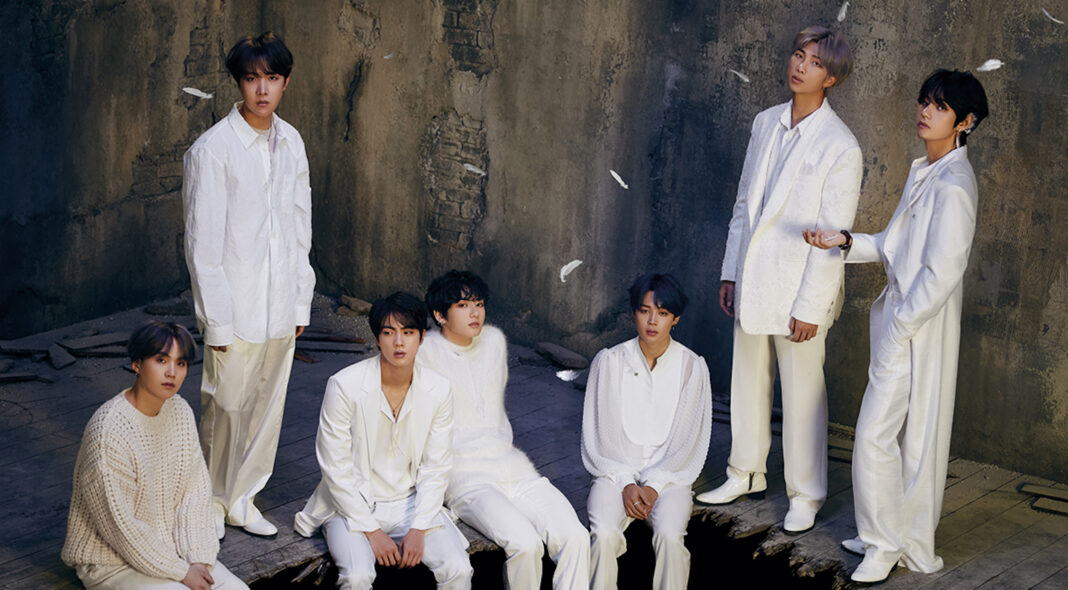There is no group in music history more synonymous with stan culture than BTS. Many representations of K-Pop stans as strange automatons with no critical faculties are rooted in cruel xenophobia, ageism, and racism rather than actual truth, but if there is one thing you can truly praise ARMY for, it is their ability to organise, to defend their boys to the hilt.
This time, they’re angry at the GRAMMYs. Last year, the group became the first ever K-Pop act to perform at the ceremony, but lost out in the ‘best pop duo/group performance’ to Ariana Grande and Lady Gaga, marking a two-for-two defeat for the group.
BTS were not nominated at all in 2020, and the year prior, got the nod for ‘Best Recording Package’ rather than anything musical, thought by some fans to be a token placatory move in the name of nominations diversity. By performing but not winning, they feel that the group have been ‘used’ by the GRAMMYs, relying on their performances to spike ratings and promote diversity without having to commit to its full endorsement. Some have compared BTS to the snubbing of The Weeknd, who boycotted future shows in 2021 after ‘Blinding Lights’ — the biggest selling song of the year — failed to receive any nominations. On the night of the ceremony, #Scammys’ and ‘’BTS already won’ trended worldwide, fans highlighting a pattern in the show’s perceived bias towards white westernised artists.
Though the group themselves were stoic in their disappointment — “We’ll be back with even greater music, good performances and even better music”, they assured ARMY after the event — fans fear that 2022 might be a similar story. BTS will be performing ‘Butter’ and are once again up for Best Pop Performance, no more and no less. Ruminating over past disappointments, many ARMY members are contemplating boycotting the ceremony altogether, sending a message of displeasure via plummeting ratings. It’s a statement that many made last year; by tuning out en masse immediately after BTS’ performance, they hope that the GRAMMYs will recognise how intrinsic they are to ratings and reconsider their past snubs.
I don’t think I’m quite entrenched enough to consider myself full ARMY, but I share their frustrations. To deny a group of BTS’ dexterity, effort and down-right catchiness is a pretty noticeable travesty, especially given how consistent their last few records have been. Very few groups can profess to work harder, and with both ‘Butter’ and ‘Dynamite’, they possess songs that deliver on the imaginations of what great music can be, fun and uplifting and flawlessly performed. In terms of critical appraisal, it’s difficult to see what more a judge might want; from their choreography to their attitude to music, they are easily world-class.
And yet over the years, a great many western awards ceremonies have been reluctant to praise K-Pop, side-lining it into its own categories or fan-led voting rather than outright awards. Perhaps it is the voting itself that’s the problem; though the GRAMMYs awarding academy has diversified over the years (BTS themselves were invited to join in 2019), it is still dominated by a demographic of experts that might be more inclined to value art that sits within a well-established American trajectory; country, hip-hop and English-speaking pop. 2022’s event will be the first to come with an inclusion rider than ensures equity and inclusion in the event’s staff, but is not immediately clear whether this extends to judging, or if ‘inclusion’ truly includes Asian representation as evenly as Black and White. As such, fans conclude that K-Pop has been minimised as a superficial art form, even in spite of its enormous international success. By utilising ‘Scammys’ rhetoric, they reflect on perceptions of the waning relevancy of award ceremonies in general, unable to keep up with a fair reflection of where modern music tastes are at.
As we draw ever closer to the big day on April 4, I feel a little torn. It seems inevitable that one day BTS will meet their goal, that K-Pop’s enduring showcase of talent cannot go unrewarded for much longer. But in the same breath, I worry that Scammys defence will only cause the academy to double down further, not wanting to be seen to bow down to fan pressure. I want BTS to win —hopefully for many years to come — on their own merits, and not just be tossed one award to try and keep fans quiet. But I also hope that in seeing the outcry, the voting academy will realise what this band means, and how praiseworthy music can be as much about the people it inspires as the melody of the song itself.
To think about this at all is to think about what true success really means. When a group like BTS are unmistakably one of the biggest in the world, it’s easy to think that a trophy doesn’t matter. And in some ways, it doesn’t — just look at Dolly Parton and her Rock N’ Roll Hall of Fame rescission, not wanting to split votes. But in other ways, it matters a great deal. As a Korean group who have not so much broken western markets as redefined them, a GRAMMY win for BTS serves as evidence that their music is not just popular, but credible, acknowledged by the recording academy as worthy of due global respect. It’s something that clearly means a lot; maybe it shouldn’t be this important, but the ever-lingering genre snobberies of the industry make it so, elevating that golden gramophone to career-defining status. Even if awards supposedly don’t matter, which artist can truly say that they wouldn’t want to see one on their mantlepiece, to know that they have truly been accepted as a creator of great art?
While a mass tune-out after BTS’ performance will be noticeable in the ratings, it remains to be seen whether tuning in and immediately tuning out is really the fan action to make a difference. But you can’t blame fans for trying, for hoping that 2022 will finally be the year to see credit where it has long been overdue. When that envelope opens, let’s hope the ‘Butter’ is golden; for Army’s sake and ours.
READ MORE: I spent a day in K-pop’s UNIVERSE app so you don’t have to







